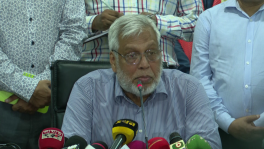Protect doctors, not attack them
The incidents of violence at institutions like DMCH and SBMCH expose deeper systemic issues in Bangladesh's healthcare sector that require immediate, multi-sectoral interventions

On 31 August, reportedly, a patient's death at the Dhaka Medical College Hospital (DMCH) caused a flare-up when loved ones alleged negligence on the part of the doctors. It led to attacks on three doctors on the hospital premises.
A strike by DMCH doctors was announced and later withdrawn after Health Adviser Noorjahan Begum reassured them of security and arrests of the perpetrators.
On 2 September, one of the culprits, Sanjoy Pal Joy, was caught.
Less than a month had passed since the heinous act when intern doctors at Barisal's Sher-e-Bangla Medical College Hospital (SBMCH) resorted to strike after an alleged physical and verbal assault by the underage patient's kin. The patient in question was 8-years-old Junayed suffering from pneumonia and other diseases.
The strike began on 28 September morning to protest the assault and declared key demands such as 24-hour security for the medical staff, admissions of patients according to the number of available beds, and a call for a prompt law to protect doctors.
However, the doctors withdrew the strike following the resignation of the director of SBMCH, Saiful Islam. This strike suspension is temporary, the interns are insisting on the appointment of an army officer as the new hospital director.
According to a study surveying 1,081 healthcare professionals and published in the International Journal of Public Health, 43% of Bangladeshi healthcare workers have experienced some physical violence and 84% of them experienced non-physical violence during their duty period.
Yet, when the doctors propose any work strike, many point to the Hippocratic Oath as though they vowed to serve their duty under the threat of violence, as though as doctors they are supposed to forgo their right to security and safety.
Despite previous protests, the situation has escalated to a point where doctors have gone on strike. However, the government has only responded with promises of justice.
What's behind the attacks on doctors?
Various reasons contribute to this issue, including growing mistrust between patients and doctors, long waiting times, delays in medical care, underdeveloped facilities and infrastructure and the immense workload that healthcare professionals face.
In Bangladesh, the doctor-to-patient ratio stands at 0.52:1000, far below the WHO recommendation of 1:1000. This disparity often means that doctors must work extended hours under challenging conditions and with low wages.
While many professions have regulated working hours, it remains unclear if any law governs healthcare professionals' working hours—or, if it does, whether it's properly enforced. These working conditions limit healthcare providers' ability to engage meaningfully with patients, often resulting in rushed consultations and poor communication.
On the other hand, some doctors perceive patients as uneducated or uninformed, failing to recognise that patients may indeed be knowledgeable about their conditions. This assumption can lead to a dismissive attitude and further widens the communication gap between doctors and patients.
To bridge this gap, healthcare professionals must ensure that they explain treatment plans and delays transparently and provide clear cost estimates to patients and their families.
Doctors should also remember that while they may see numerous patients in a day, for each individual patient, this interaction is critical and likely their only opportunity to seek answers and reassurance.
Patients, particularly those feeling vulnerable or "helpless," often only get one chance to consult the doctor each day, and they expect understanding and attention during that time.
Our grim 'healthcare' reality
The violence against healthcare workers in Bangladesh spans from mob attacks to individual confrontations within hospital settings, marking a concerning trend that undermines both the quality of healthcare and the morale of medical professionals.
Many people view hospitals as places to seek help only when symptoms are severe, treating them more as centres for "sick care" than "healthcare." For example, with recurring fever, it's common to self-administer paracetamol for days, only turning to hospitals when the illness escalates.
In such situations, patients often expect doctors to deliver immediate results, or else regard them as either miracle workers or profiteers, creating an unrealistic dichotomy in public perception.
In this climate, complaints about consultation fees are frequent despite the extensive study and expertise that allow doctors to make rapid, accurate diagnoses. The frustration among patients is often rooted in unmet expectations, compounded by a lack of understanding of doctors' professional constraints.
Patients and families must learn to view doctors as dedicated professionals whose time, skill and effort are to be respected, just as in any other field. Within medicine, as in any profession, there are outstanding and underperforming practitioners. Recognising this diversity and approaching healthcare interactions with a balanced mindset can help prevent escalation.
The incidents of violence at institutions like DMCH and SBMCH expose deeper systemic issues in Bangladesh's healthcare sector that require immediate, multi-sectoral interventions.
The government must fulfil its promises by prosecuting offenders quickly and implementing protective measures within hospitals to safeguard both staff and patients' families. Regulating healthcare professionals' working hours and establishing effective channels of communication between doctors and patients are critical steps.
Everyone must understand that healthcare is a cooperative endeavour, not an adversarial one. Violence exacerbates distrust, discouraging doctors from their roles and hindering the medical profession's fundamental mission. Mobilising societal and governmental support for healthcare workers is vital to enable them to carry out their life-saving duties effectively and safely.

Zarrin Tasnim Mouri is the associate editor of the NSU Law Blog. She is an alumnus of the Department of Law at North South University.
Disclaimer: The views and opinions expressed in this article are those of the author and do not necessarily reflect the opinions and views of The Business Standard.



 Keep updated, follow The Business Standard's Google news channel
Keep updated, follow The Business Standard's Google news channel
















